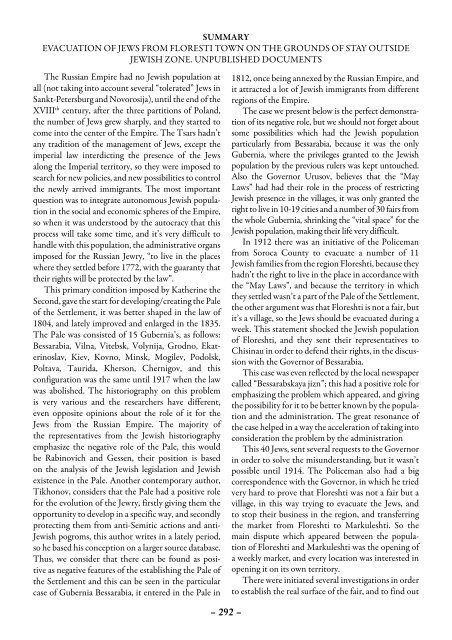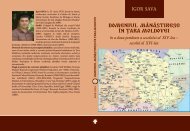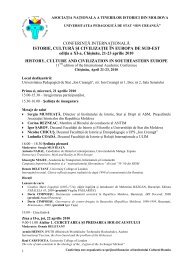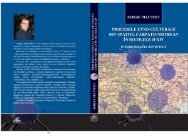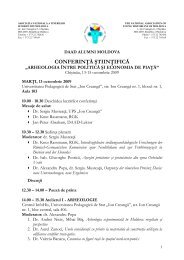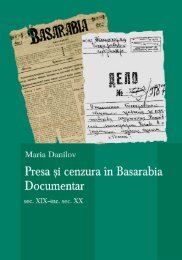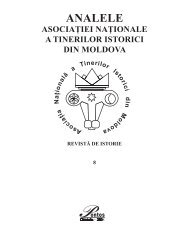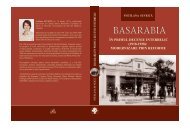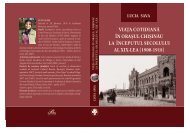aici - Asociatia Tinerilor Istorici din Moldova
aici - Asociatia Tinerilor Istorici din Moldova
aici - Asociatia Tinerilor Istorici din Moldova
Create successful ePaper yourself
Turn your PDF publications into a flip-book with our unique Google optimized e-Paper software.
SUMMARY<br />
EVACUATION OF JEWS FROM FLORESTI TOWN ON THE GROUNDS OF STAY OUTSIDE<br />
JEWISH ZONE. UNPUBLISHED DOCUMENTS<br />
The Russian Empire had no Jewish population at<br />
all (not taking into account several “tolerated” Jews in<br />
Sankt-Petersburg and Novorosija), until the end of the<br />
XVIII th century, after the three partitions of Poland,<br />
the number of Jews grew sharply, and they started to<br />
come into the center of the Empire. The Tsars hadn’t<br />
any tradition of the management of Jews, except the<br />
imperial law interdicting the presence of the Jews<br />
along the Imperial territory, so they were imposed to<br />
search for new policies, and new possibilities to control<br />
the newly arrived immigrants. The most important<br />
question was to integrate autonomous Jewish population<br />
in the social and economic spheres of the Empire,<br />
so when it was understood by the autocracy that this<br />
process will take some time, and it’s very difficult to<br />
handle with this population, the administrative organs<br />
imposed for the Russian Jewry, “to live in the places<br />
where they settled before 1772, with the guaranty that<br />
their rights will be protected by the law”.<br />
This primary condition imposed by Katherine the<br />
Second, gave the start for developing/creating the Pale<br />
of the Settlement, it was better shaped in the law of<br />
1804, and lately improved and enlarged in the 1835.<br />
The Pale was consisted of 15 Gubernia’s, as follows:<br />
Bessarabia, Vilna, Vitebsk, Volynija, Grodno, Ekaterinoslav,<br />
Kiev, Kovno, Minsk, Mogilev, Podolsk,<br />
Poltava, Taurida, Kherson, Chernigov, and this<br />
configuration was the same until 1917 when the law<br />
was abolished. The historiography on this problem<br />
is very various and the researchers have different,<br />
even opposite opinions about the role of it for the<br />
Jews from the Russian Empire. The majority of<br />
the representatives from the Jewish historiography<br />
emphasize the negative role of the Pale, this would<br />
be Rabinovich and Gessen, their position is based<br />
on the analysis of the Jewish legislation and Jewish<br />
existence in the Pale. Another contemporary author,<br />
Tikhonov, considers that the Pale had a positive role<br />
for the evolution of the Jewry, firstly giving them the<br />
opportunity to develop in a specific way, and secondly<br />
protecting them from anti-Semitic actions and anti-<br />
Jewish pogroms, this author writes in a lately period,<br />
so he based his conception on a larger source database.<br />
Thus, we consider that there can be found as positive<br />
as negative features of the establishing the Pale of<br />
the Settlement and this can be seen in the particular<br />
case of Gubernia Bessarabia, it entered in the Pale in<br />
1812, once being annexed by the Russian Empire, and<br />
it attracted a lot of Jewish immigrants from different<br />
regions of the Empire.<br />
The case we present below is the perfect demonstration<br />
of its negative role, but we should not forget about<br />
some possibilities which had the Jewish population<br />
particularly from Bessarabia, because it was the only<br />
Gubernia, where the privileges granted to the Jewish<br />
population by the previous rulers was kept untouched.<br />
Also the Governor Urusov, believes that the “May<br />
Laws” had had their role in the process of restricting<br />
Jewish presence in the villages, it was only granted the<br />
right to live in 10-19 cities and a number of 30 fairs from<br />
the whole Gubernia, shrinking the “vital space” for the<br />
Jewish population, making their life very difficult.<br />
In 1912 there was an initiative of the Policeman<br />
from Soroca County to evacuate a number of 11<br />
Jewish families from the region Floreshti, because they<br />
hadn’t the right to live in the place in accordance with<br />
the “May Laws”, and because the territory in which<br />
they settled wasn’t a part of the Pale of the Settlement,<br />
the other argument was that Floreshti is not a fair, but<br />
it’s a village, so the Jews should be evacuated during a<br />
week. This statement shocked the Jewish population<br />
of Floreshti, and they sent their representatives to<br />
Chisinau in order to defend their rights, in the discussion<br />
with the Governor of Bessarabia.<br />
This case was even reflected by the local newspaper<br />
called “Bessarabskaya jizn”; this had a positive role for<br />
emphasizing the problem which appeared, and giving<br />
the possibility for it to be better known by the population<br />
and the administration. The great resonance of<br />
the case helped in a way the acceleration of taking into<br />
consideration the problem by the administration<br />
This 40 Jews, sent several requests to the Governor<br />
in order to solve the misunderstan<strong>din</strong>g, but it wasn’t<br />
possible until 1914. The Policeman also had a big<br />
correspondence with the Governor, in which he tried<br />
very hard to prove that Floreshti was not a fair but a<br />
village, in this way trying to evacuate the Jews, and<br />
to stop their business in the region, and transferring<br />
the market from Floreshti to Markuleshti. So the<br />
main dispute which appeared between the population<br />
of Floreshti and Markuleshti was the opening of<br />
a weekly market, and every location was interested in<br />
opening it on its own territory.<br />
There were initiated several investigations in order<br />
to establish the real surface of the fair, and to find out<br />
– 292 –


